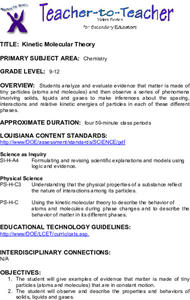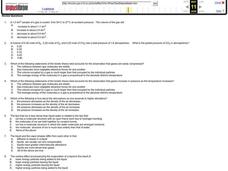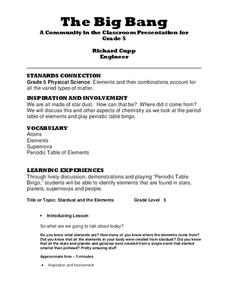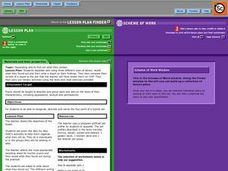Virginia Department of Education
The Particle Theory of Matter
Demonstrate the particle theory of matter to high school scientists with an engaging experiment that allows them to visually see the results as substances change from one state to another. The class concludes with a discussion about how...
Curated OER
Activity #3 Are Particles "Real?"
Students verbalize a simple particle theory, They apply their particle theory to explain what happens during chemical reactions and how this theory supports the law of conservation of matter. Pupils comprehend that the atomic theory,...
Curated OER
States of Matter
Students explore the states of matter. They discuss the different phrases of matter and categorize everyday substances as solids, liquids, or gases. Students explore the relationship between the phases on an atomic level and the role of...
Curated OER
A Matter of State
Students conduct science experiments to understand that particle movement changes as a substance changes from one phase to another phase. Students record observations of experiments that involve the three states of matter: solid,...
Curated OER
Properties of Materials - Part B
Students describe the history of materials. They use the kinetic (particle) theory to explain changes of state in matter and trace the flow of heat during changes of state and chemical changes.
Curated OER
Kinetic Molecular Theory
High schoolers analyze and evaluate evidence that matter is made of tiny particles. They observe a series of phenomena involving solids, liquids, and gases to make inferences about the spacing, interactions and relative kinetic energies...
Virginia Department of Education
States of Matter
Scientists have been studying exothermic reactions before they were cool. The instructional activity begins with a discussion and a demonstration of heat curves. Scholars then determine the heat of fusion of ice and the...
Curated OER
Activity #5 Environmental Effects
Students explain the implications of particle theory of The Law of Conservation of Matter for problems of pollution and waste disposal. They describe, in terms of atoms and molecules, what happens to materials when they are dissolved or...
Curated OER
Phases of Matter
In this matter worksheet, students calculate volume and partial pressure for gases, compare liquid and vapor phases, and review the characteristics properties of gases. This worksheet has 12 multiple choice and 3 problems to solve.
Curated OER
Hierarchy Theory and Biotic Hierarchy
Students examine the hierarchy theory and biotic organization by playing a teacher-created card game matching groups of items, such as organelles, in suits of four. They discuss the reasons for their hierarchical organization of the...
Virginia Department of Education
The Rate of a Chemical Reaction
If your pupils think a catalyst is a list of their cats, then this might be the lesson plan for you! Young chemists study the effect of temperature, catalysts, concentration, and particle size on reaction rates during four different...
Curated OER
Expansion of solids
Seventh graders relate knowledge of the particle theory of matter to observations of the expansion of solids. They watch a demonstration of heat with a copper ball and hoop. They watch a second demonstration with a bimetallic strip.
Curated OER
Relative Masses
Students investigate relative mass using 8 different items. In this relative masses lesson plan, students discuss as a class John Dalton's atomic theory. They take the masses of the 8 items and record their data. They discuss relative...
Curated OER
States of Matter
Students categorize items into one of the three states of matter. They participate in a demonstration in which they represent particles of matter. Finally, they complete an experiment in which they "race" top see who can make acetone...
Curated OER
Classifying Matter Game
Students identify the different states of matter. In this chemistry lesson, students differentiate the physical properties of the three states. They apply what they learned by playing a team game at the end of the lesson.
Curated OER
Atomic Structure and Quantum Theory
Students are introduced to the structure of an atom and Dalton's atomic theory through a short video and mini-lecture. They also take a look at the weight of mass and become familiar with the idea of quantum theory
Curated OER
Theoretical Quantum Physics... For Kids!
Students explore quantum physics by participating in several class activities. In this space-time lesson, students discuss the concepts of time traveling and the anatomy of an atom. Students draw geometric figures and utilize string to...
Curated OER
Mystery : Structure of the Atom-A Case for Indirect Evidence
Students investigate the structure of the atom through hands on activities. In this atomic structure lesson, students perform 4 activities showing indirect evidence of the structure of the atom and the parts of the atom. They also list...
Curated OER
The Big Bang
Fifth graders relate the elements in the human body to those produced during a supernova. In this space science and chemistry lesson, 5th graders listen to a lecture and view visuals about the big bang. They relate the production of...
Virginia Department of Education
Thermochemistry: Heat and Chemical Changes
What makes particles attract? Here, learners engage in multiple activities that fully describe colligative properties and allow the ability to critically assess the importance of these properties in daily life. Young chemists...
Curated OER
Materials And Their Properties
Seventh graders investigate the particulate level of solids, liquids, and gases. They examine how the particle method show the interplay between scientific theories and evidence.
Curated OER
Putting the Ice in Hockey
Eighth grade physical science classes examine why the ice on which hockey is played is slippery. They do so by discussing phases of matter and the molecular motion in each. They read an article on a website and write out answers to...
Curated OER
Modern Physics, New Phenomena
For this physics worksheet, young scholars examine some of the historical theories of physics through the completion of 11 questions.
Virginia Department of Education
Soap, Slime, and Creative Chromatography
Do you think chromatography paper suffers from separation anxiety? Young chemists make soap, slime, silly putty, and experiment with chromatography in this lesson. The material includes clear instructions for each experiment along with...

























